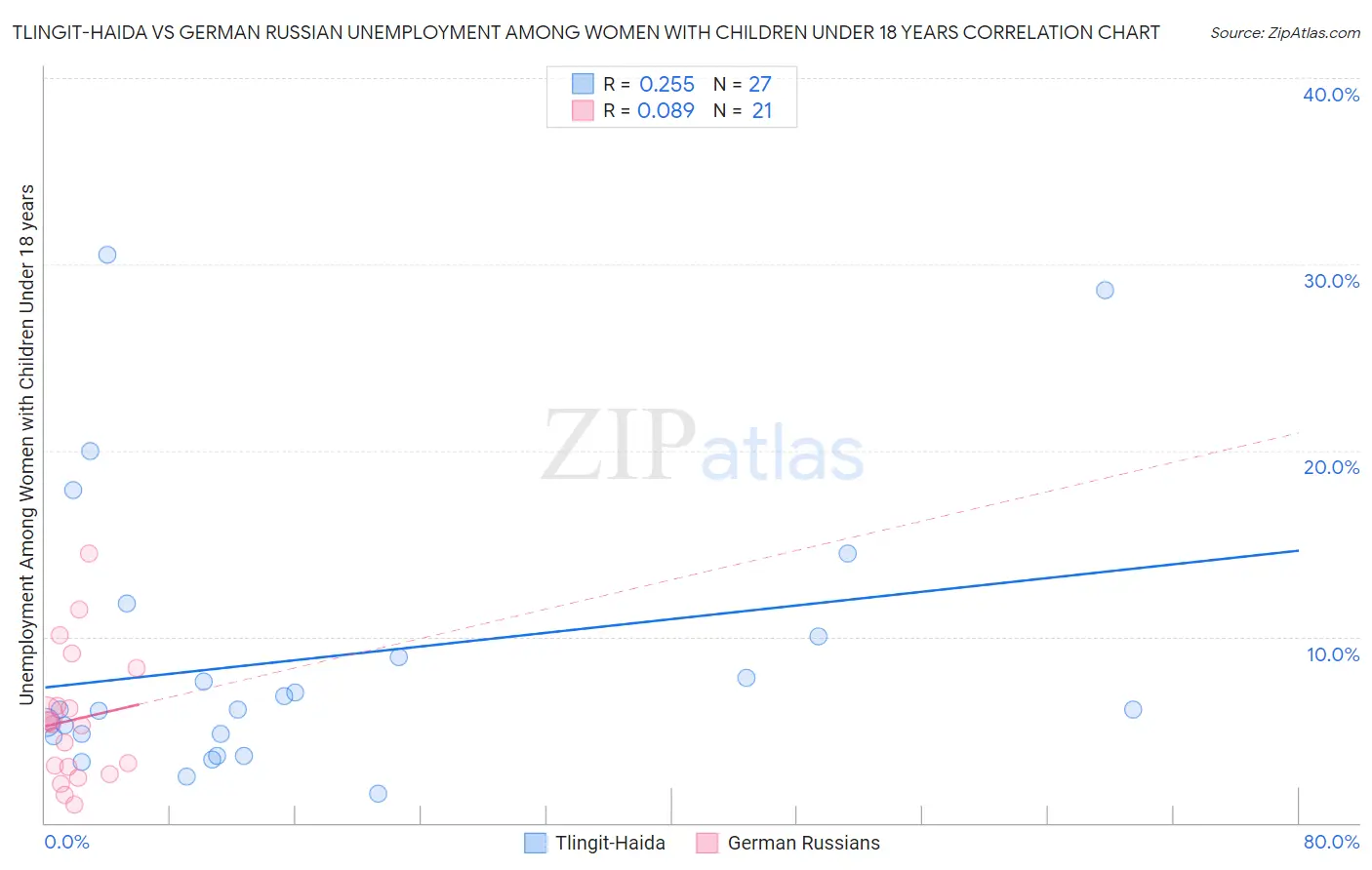Tlingit-Haida vs German Russian Unemployment Among Women with Children Under 18 years
COMPARE
Tlingit-Haida
German Russian
Unemployment Among Women with Children Under 18 years
Unemployment Among Women with Children Under 18 years Comparison
Tlingit-Haida
German Russians
5.4%
UNEMPLOYMENT AMONG WOMEN WITH CHILDREN UNDER 18 YEARS
61.9/ 100
METRIC RATING
165th/ 347
METRIC RANK
5.4%
UNEMPLOYMENT AMONG WOMEN WITH CHILDREN UNDER 18 YEARS
70.2/ 100
METRIC RATING
157th/ 347
METRIC RANK
Tlingit-Haida vs German Russian Unemployment Among Women with Children Under 18 years Correlation Chart
The statistical analysis conducted on geographies consisting of 59,920,884 people shows a weak positive correlation between the proportion of Tlingit-Haida and unemployment rate among women with children under the age of 18 in the United States with a correlation coefficient (R) of 0.255 and weighted average of 5.4%. Similarly, the statistical analysis conducted on geographies consisting of 94,995,777 people shows a slight positive correlation between the proportion of German Russians and unemployment rate among women with children under the age of 18 in the United States with a correlation coefficient (R) of 0.089 and weighted average of 5.4%, a difference of 0.67%.

Unemployment Among Women with Children Under 18 years Correlation Summary
| Measurement | Tlingit-Haida | German Russian |
| Minimum | 1.6% | 0.98% |
| Maximum | 30.5% | 14.5% |
| Range | 28.9% | 13.5% |
| Mean | 8.8% | 5.5% |
| Median | 6.1% | 5.3% |
| Interquartile 25% (IQ1) | 4.7% | 2.8% |
| Interquartile 75% (IQ3) | 10.0% | 7.3% |
| Interquartile Range (IQR) | 5.3% | 4.5% |
| Standard Deviation (Sample) | 7.4% | 3.5% |
| Standard Deviation (Population) | 7.3% | 3.4% |
Demographics Similar to Tlingit-Haida and German Russians by Unemployment Among Women with Children Under 18 years
In terms of unemployment among women with children under 18 years, the demographic groups most similar to Tlingit-Haida are Celtic (5.4%, a difference of 0.090%), Aleut (5.4%, a difference of 0.19%), Lebanese (5.4%, a difference of 0.22%), Immigrants from Saudi Arabia (5.4%, a difference of 0.24%), and Immigrants from Denmark (5.4%, a difference of 0.29%). Similarly, the demographic groups most similar to German Russians are South African (5.4%, a difference of 0.010%), Korean (5.4%, a difference of 0.030%), Carpatho Rusyn (5.4%, a difference of 0.050%), Immigrants from Latvia (5.4%, a difference of 0.050%), and Immigrants from Burma/Myanmar (5.4%, a difference of 0.060%).
| Demographics | Rating | Rank | Unemployment Among Women with Children Under 18 years |
| Immigrants | Iran | 71.1 /100 | #151 | Good 5.4% |
| Immigrants | South Eastern Asia | 71.1 /100 | #152 | Good 5.4% |
| Carpatho Rusyns | 70.8 /100 | #153 | Good 5.4% |
| Immigrants | Latvia | 70.8 /100 | #154 | Good 5.4% |
| Koreans | 70.5 /100 | #155 | Good 5.4% |
| South Africans | 70.3 /100 | #156 | Good 5.4% |
| German Russians | 70.2 /100 | #157 | Good 5.4% |
| Immigrants | Burma/Myanmar | 69.5 /100 | #158 | Good 5.4% |
| Chickasaw | 68.4 /100 | #159 | Good 5.4% |
| Afghans | 66.6 /100 | #160 | Good 5.4% |
| Immigrants | Iraq | 65.9 /100 | #161 | Good 5.4% |
| Immigrants | Saudi Arabia | 65.0 /100 | #162 | Good 5.4% |
| Lebanese | 64.7 /100 | #163 | Good 5.4% |
| Celtics | 63.0 /100 | #164 | Good 5.4% |
| Tlingit-Haida | 61.9 /100 | #165 | Good 5.4% |
| Aleuts | 59.4 /100 | #166 | Average 5.4% |
| Immigrants | Denmark | 58.0 /100 | #167 | Average 5.4% |
| Immigrants | Northern Africa | 56.1 /100 | #168 | Average 5.4% |
| Immigrants | Thailand | 55.3 /100 | #169 | Average 5.4% |
| Samoans | 54.1 /100 | #170 | Average 5.4% |
| Immigrants | Philippines | 53.1 /100 | #171 | Average 5.4% |